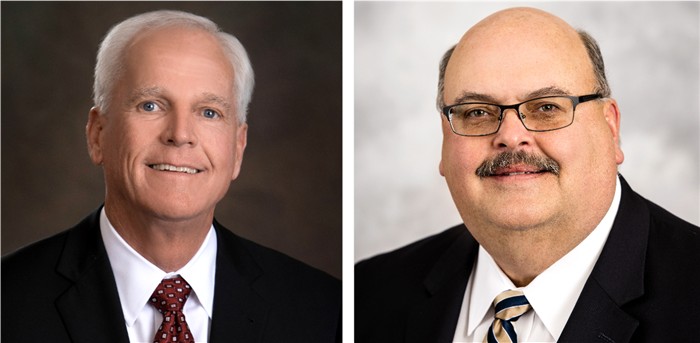By Robert Berry and Anthony “Tony” Campbell

L to R: Robert Berry, President and CEO of Big Rivers Electric Corp. & Anthony “Tony” Campbell, President and CEO of East Kentucky Power Cooperative
![]()
February’s bitterly cold temperatures, pushing deep into the southern U.S. and persisting for days, severely tested Texas’ electric infrastructure, exposing weaknesses and providing valuable lessons about reliability.
When the temperature plunges and people depend on electricity for heat, reliability is vitally important. Millions of Texans lost power for days, and at least 57 deaths have been attributed to the winter storm and bitter cold according to the Texas health department.
To keep your lights on and heat running, grid operators must have a wide range of energy options during crises, and those must include resources to ensure 24/7/365 service. We are speaking from experience. Our cooperatives own and operate power plants and transmission lines, providing energy for 1.4 million Kentucky residents served by 19 not-for-profit, member-owned electric cooperatives.
While eastern Kentucky faced challenges as heavy ice and snow damaged power lines, Texas faced many different and more widespread circumstances because energy was cut off at its source—power plants. At one point in the crisis, almost half of Texas’ plants were off due to the weather, which affected wind turbines, gas pipelines, solar panels and even coal and nuclear plants that were not ready for the weather. Demand for electricity and fuel drove prices in Texas’ deregulated markets through the roof, leaving some customers with monthly power bills in the thousands of dollars.
Will Kentucky someday face the same fate? We believe the commonwealth is much better prepared. Wise state government policies and our co-ops’ focus on reliability have kept power plants open and running, able to provide backup in such crises. Numerous interstate natural gas pipelines cross Kentucky and our coal plants routinely keep 30 to 60 days of fuel on-site.
Our co-ops also have options outside of our own power plants. Big Rivers Electric Corporation is part of a power market covering 15 states and a Canadian province. East Kentucky Power Cooperative (EKPC) is a member of a 13-state market. Texas, on the other hand, has not seen the benefits of connecting to other states’ grids—until now.
We recognize renewables are an essential part of our energy production. They offer competitive prices with low or no carbon emissions. In the past year, Big Rivers announced agreements to purchase from two large Kentucky solar farms, and by 2024, Big Rivers will produce approximately 22% of its energy from renewable sources.
Meanwhile, EKPC built and operates one of Kentucky’s largest solar farms and, in recent months, announced its goal to produce 15% of its energy from new renewables by 2035.
But, as we plan for a reliable electric grid, we must be candid with ourselves about the capabilities of renewables. They will not make electricity when the sun doesn’t shine or the wind doesn’t blow. Utility-scale batteries can provide a few hours—not days—of interim power.
When temperatures plunge below freezing, mere hopes for sunshine and wind are not sufficient to keep the lights on. Traditional power sources like coal, natural gas, and nuclear—properly weatherized to withstand extreme cold—must continue to have a place in our power mix.
As Kentucky transitions to a future where renewables will play a much greater role, we call on policy-makers to ensure we do so at a pace that protects reliable electric service—and perhaps even lives.
---
Robert Berry is President and CEO of Big Rivers Electric Corp., which provides power to three Kentucky electric cooperatives. Anthony “Tony” Campbell is President and CEO of East Kentucky Power Cooperative, which provides power to 16 Kentucky electric cooperatives.









